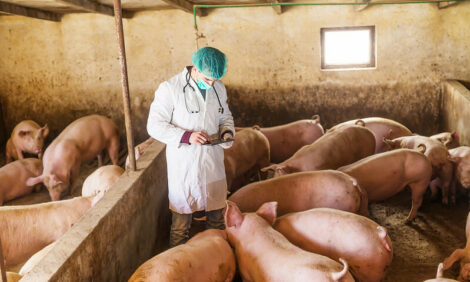



A(H1N1) Kills Pork Sales in Trinidad and Tobago
TRINIDAD & TOBAGO - What's in a name? Apparently, enough to hurt the pig farming industry in Trinidad and Tobago.Since the emergence of the Influenza A H1N1 virus, commonly called "swine flu", the pork industry around the world has experienced a decline in sales.
And now that Trinidad and Tobago has its first case of the potentially fatal virus, local pig farmers believe sales will only go from bad to worse.
Livestock farmers say pigs have been given a bad rap and blame the drop in sales on misinformation as some consumers are still sceptical about the safety of pork.
"Sales were poor before H1N1, but since it appeared on the scene, it has gotten really bad now. People have reservations about eating pork. I have a friend who sells meat in Port of Spain and when he would normally sell around 170 -180 pounds of pork in one weekend, he managed to sell just four pounds of pork.
"Another friend of mine sells in Tunapuna and in one weekend he sold just two pounds of pork. I could definitely see the industry collapsing. This whole situation is just devastating to the small farmer who is trying to earn a living," said livestock farmer Wayne Bowen.
Whereas, farmer Nigel Khan used to cull around four pigs a week to sell, Khan said for the past month he has not been selling because consumers are not buying and instead, uncertain shoppers are opting for chicken or beef.
According to Trinidad & Tobago Express, business has been anything but smooth sailing for local pig farmers who are struggling to keep their livelihoods afloat even as large processors control around 95 per cent of the market.
Last year, several farmers had to deal with a spate of robberies and now the farmers feel penalised as the new virus has caused many to think twice before buying pork.
The European Union Health Commission has pointed out that although pigs were the original source of the virus, swine flu cannot pass from animals to humans, but only from humans to humans.
Despite the readily available information on swine flu, what frustrates local pig farmers is that pigs are still being stigmatised and looked upon as somewhat of a 'poster child' for the virus.
,br>
In support of their foreign counterparts, local pig farmers are pleading with consumers to stop using the term 'swine flu'.
"I don't use the words 'swine flu', it just sends the wrong message and it gives the pig a bad name," said pig farmer Maude Watson-Duberry.
"Sales would only get worse if consumers do not realise that they cannot get the virus from eating pork. People need to be properly educated so that they will resume eating pork," she said.
Both farmers Bowen and Duberry are adamant that the Ministry of Agriculture, Land and Marine Resources must do more to support pig farmers and to restore consumers confidence in pork and pork products.
As the Business Express spoke with Duberry last Thursday, she and her colleagues received a leaflet from the Animal Health sub-division in which the ministry makes the point that it is safe to eat pork. But as far as the farmers are concerned, the damage may already be done.
"This is too little, too late. We farmers know that our pork is safe, information like this should be everywhere for the public to see so that they can start buying pork freely again," said Duberry.

